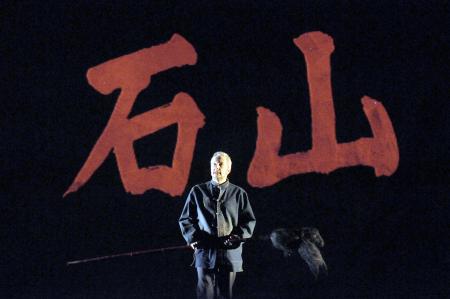Blue Dragon: visually sophisticated

Like anyone who has seen a production by theatrical genius Robert Lepage, I’ve come to expect, and to love, his stage wizardry and to be riveted by his brilliant theatrical sleight of hand and how he uses the elements of the stage as though they were utterly malleable, transformable.
In a Lepage production a prop, a set piece, indeed a character can melt into something or someone quite different thus drawing into question the nature of reality and of truth. For many, Lepage is a kind of Houdini but with intellectual concerns that can be compared to those of any great writer or metteur en scène.
So, I had high hopes going into Ex Machina's Le Dragon Bleu or The Blue Dragon, depending on which language one sees it in. And, in theatrical inventiveness and aesthetic beauty, the production delivered. Unfortunately, I can’t say quite that the storyline delivered the intellectual knockout punch that I had hoped for. There are plenty of moments that are witty and humorous, and some that come near to being emotionally affecting, but for the most part the narrative was on the safe side without any of Lepage’s more typically provocative ruminations on life, art, and politics.
The set, with its multiple projections of images and video was a thing of well-wrought beauty. There were plenty of clever set changes, miniaturized, but otherwise perfectly realistic trains going by in what was clearly meant to be the Chinese countryside, and some lovely scenes where characters “rode” by on what appeared to be nearly floating bicycles. Every set change was at once lovely and meaningful, and not a detail to do with props, set, lights or sound was overlooked. In Lepage’s hands, the theatre truly is a blank slate with a thousand possibilities and a thousand transformations. As Lepage’s character, Pierre la Montagne, muses as he works on his Chinese calligraphy, “A word is worth a thousand images.” In his theatrical inventiveness, Lepage succeeds absolutely.
In spite of all the thrilling aesthetics, however, the story has not particularly stuck with me in the days after the show. Lepage draws on big themes including identity, aging, globalization, nationalism and the role of love amidst all of this, but I feel as though he left too much unexplained at times, and at times too much was left to chance while the characters let themselves be passively manipulated by the hands of fate. But perhaps it was Lepage’s performance itself that fell a bit flat. The other characters were more compelling. Marie Michaud as Claire Forêt is sympathetic and engaging, while Tai Wei Foo provides an intriguing and affecting portrayal of the gifted young artist Xiao Ling. Unfortunately, Lepage, whose character is the link between the other two, seemed flat and even uncomfortable in this role. This had the effect of detracting from a story that already verged on being pedantic at times and dry at others.
Would I recommend this show? In spite of what I just wrote about the storyline, I would, in fact recommend seeing it. The story does have moments of humour and a certain amount of depth that many writers do not attempt in their writing. That depth doesn’t come through perfectly in this production, but Lepage still does manage to deal with some of the big issues with intelligence if not with his usual intellectual gravity. And, the staging is visionary and excellent. The first time I saw a Lepage show, the effect it had on me reminded me somewhat of the effect of the first time I saw the Cirque du Soleil; I was riveted and enthralled and utterly at a loss to explain how certain aspects could have come to life so effectively. So, go see The Blue Dragon for the artistry and the sophisticated staging. This all on its own is worth seeing and pondering.
The Blue Dragon by Marie Michaud and Robert Lepage. Directed by Robert Lepage. An Ex Machina production. Presented by SFU Contemporary Arts and the Cultural Olympiad with Théâtre La Seizième. At SFU at Woodward’s Fei and Milton Wong Experimental Theatre. Continues until February 27. For more information go here.



